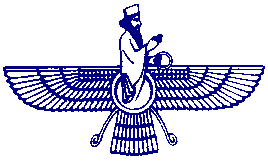 |
Zarathushtra Discussion Group[ Home | Contents | Search | Post | Reply | Next | Previous | Up ]
|
From: Dina G. McIntyre
Email: dinamci@aol.com
Date: 10 Jul 2000
Time: 17:34:01
Dear John,
Thanks for the link to Cyrus' cylinder. It was very interesting. In the Yenghe Haataam prayer (a Zarathushti prayer) we say that we worship (yesne) all good men and women.... etc. Notice the word "worship". This does not mean that we literally "worship" human beings, however good. Translation is always a difficult thing, especially when it spans millennia and very different cultures. In the Yenghe Haatam prayer, actually the objects of worship referred to are a mixed bag -- they are the attributes of God (the amesha spenta) as well as those men and women who have attained them. So the word "worship" is not used in its traditional English sense. Perhaps "honor" might be a more accurate English equivalent.
Cyrus was a warrior, but also a statesman, a diplomat, who knew that he could never hold together his subjects from different lands with different cultures, and religious beliefs, unless he respected what was dear to them, such as their gods.
His showing respect for Marduk was no different from me going into a church, and lighting a candle (although I am not a Christian), or genuflecting before the alter. Technically both of these acts might be considered an act of worship, but actually, they are more a matter of paying honor or respect to another person's notion of God.
You may notice that the cylinder is in Akkadian. This was not the language of the Aechemenian court, and was not the language of Cyrus, who hailed from Anshan. It was (in my opinion) directed to his Babylonian subjects, which probably made their priests (a power structure in themselves) very happy. It probably also made the common folks think that Cyrus' legitamacy stemmed from their own god, Marduk.
It is not much different from his treatment in Isaiah, where Cyrus is described as the anointed one of the Jewish God, and indeed the Messiah.
By respecting the gods of his subjects, and by claiming to have their approval he gave his sovereignty legitimacy in the eyes of his subjects (which in turn probably reduced the chances of rebellion, especially if he ruled justly or "righteously" as the cylinder states.
Prof. Stanley Insler of Yale University expressed the belief in a recent lecture in London, that the early Aechemenians were Zoroastrians, based on the values that found expression in their actions, and also based on Darius's inscription wherein he acknowledges Ahura Mazda as his God. I am not an expert on the history of the Aechamenians, and cannot tell you what other inscriptions there may be of Cyrus which might reflect his religious beliefs. However the cylinder mentions the virtues which comprise the "asha" -- the core of Zarathushti beliefs. I do not know if Marduk's religion had similar beliefs. You may wish to consult the Cambridge History of Iran Vol. II, although that may not be up to date on the latest archaeological discoveries. Wish I could be of more help.
Wishing you the best,
Dina.
![]()